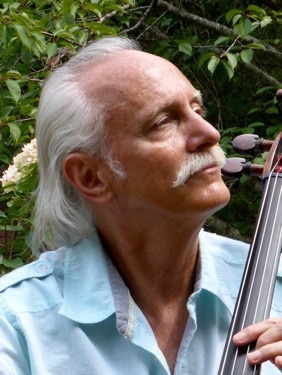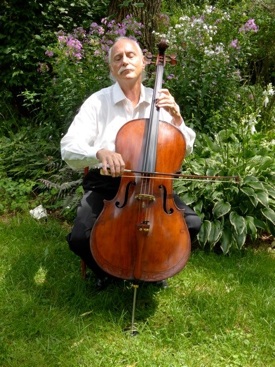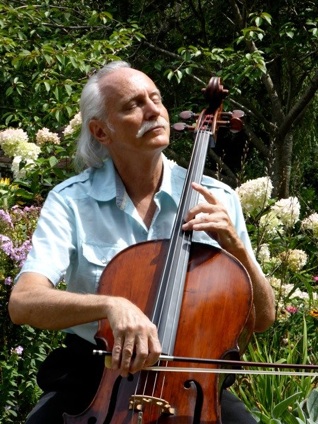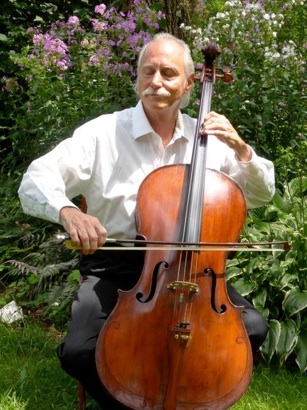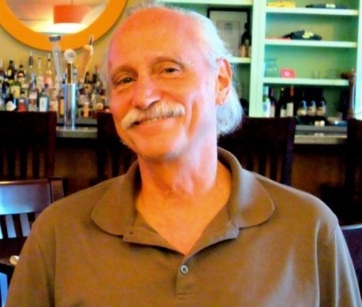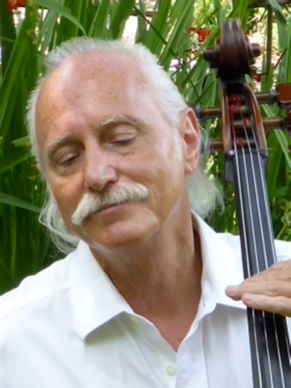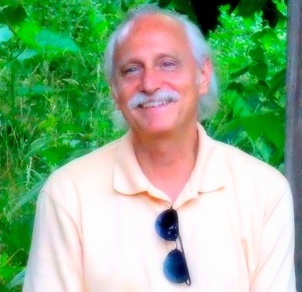I first heard cellist Ron Clearfield’s music when I was reviewing for the original Wind and Wire magazine back in the late 1990’s. Cello has always been my second-favorite instrument (after the piano, of course!) and Ron’s music is some of the most beautiful I’ve ever heard - so soothing and soulful, but with plenty of substance. He recently released his fourth album of original music, The Healing Muse, which is a stunning compilation of the best of his three previous albums - and a Favorite for 2014! In addition to composing his own music, Ron is a conductor, has been a teacher for many years, and has been performing solo and with orchestras for most of his life. This interview is long overdue, and I’m so glad Ron Clearfield had time to chat with MainlyPiano.com!
KP: You recently released
The Healing Muse, a compilation of the most soothing, uplifting and healing pieces from your first three albums. The story of how this album came about is fascinating. Do you mind retelling it?
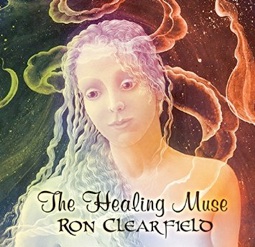
Click the album covers to read Kathy's reviews.
RC: People told me over the years that my music has a very healing quality that combines the beauty of the cello immersed in my peaceful and heart-felt music. Two experiences, though, really made it clear that I needed to release an album for healing. The first came from a friend of mine who taught young children in public schools. She sent me this message, "Ron, I wanted to tell you about something special that happened yesterday. As I’ve told you, I play your music every day at lunchtime for my first grade class to calm the children down after lunch (it calms me down too!) I have a boy in my class who is on medication for severe ADHD. He’s a very sweet boy but his energy is just unmanageable so his mother gives him high doses of medication just to keep him in his body and able to function. Yesterday, he told me his head was on fire and when I felt his head, he was burning up. I got him an ice pack to put on his head and sent him to lunch. When he came back from lunch, I put on your music as I always do during quiet time. I noticed that after awhile he got up to throw the ice pack away. I asked him how he felt and he said, ‘I'm ok now, the pain is gone. The music pulled it out of my head!’”
Another story involved a close friend who was driving home late one night when four very intoxicated youths approached him from behind in another car. Their car crossed a small arched bridge traveling at over 80 miles an hour. Their car became airborne, landing directly on top of my friend's car. The youths died instantly, but even though his head and body were severely crushed, my friend was kept alive in an intensive care facility. He remained in a deep coma unchanged, unresponsive and motionless in a fetal position for weeks and weeks. I had heard about the accident and wanted to see if I could help so I asked if I could come and play for him. The family and staff agreed, so I arrived one afternoon with my lone cello and lots of hope. I had only been playing for about five or ten minutes when the nurses started frantically running around the room crying out to each other. I was fascinated by what was going on but stayed focused on producing warm, beautiful musical sounds. Eventually I finished and I walked out of the room and talked with one of the nurses. “What happened!?” She was very excited and explained that while I was playing, he had moved for the first time since his accident. He had actually relaxed and released his clenched arms and hands that were locked around his chest and extended them to his sides. As it turned out, this was an important first step in his long road to recovery which led to his becoming more and more responsive and ultimately exiting from his coma. After many months of recuperation and therapy, he left the hospital and to this day he lives an active, creative and happy life.
KP: Those are both really amazing stories and such an inspiration! What do you think it is that makes some pieces or types of music more “healing” than others?
RC: When I hear music that is really beautiful and it helps me connect with my heart, this is the kind of music I gravitate to for physical and emotional healing.
KP: Do you think the healing quality of music varies much from one person to the next?
RC: Everyone's musical tastes are so different. It has to be found and known by the individual. One person's musical medicine isn't always the same for everyone.
KP: I recently saw the documentary, Alive Inside, which shows how a person’s favorite music can reach him or her, even in severe cases of dementia and Alzheimer’s, and how patients can become engaged with life again, if only for a short time. They were calling music “the back door to the mind.” Really amazing stuff, but also frustrating in that the doctors in these facilities can get outrageously expensive drugs okayed - even those that don’t work - but can’t get the funds to get iPods for these patients. Do you have any experience with this?
RC: I really agree that our health institutions do need to give patients additional healing therapies that would definitely include music. The power of music is so strong and can and should be utilized to help with many different disorders.
KP: There have been long time spans between your album releases and yet you are a full-time musician. What other kinds of musical activities are you doing?
RC: For over 40 years I was an orchestral cellist playing with major orchestras and freelancing all over the country. Then about 25 years ago, I got into conducting and ended up directing three orchestras here in Asheville, NC. I've always enjoyed lots of commercial work, too, like recording and arranging for different artists. I play with a string trio and of course I perform my own music in solo concerts. I also (and I can proudly say this) taught as a private teacher for many, many years, but now limit my teaching through conducting the Asheville Youth Orchestra.
KP: What is the age range of the musicians in the Youth Orchestra and how did you get started with that?
RC: The students in my orchestra are mostly in high school but I've accepted a few as young as 10. I had a violinist once who was a child prodigy and actually became concertmaster and soloist with the orchestra when she was only 11. I got started working with the youth when my family and I first moved from Miami to Asheville, NC when I took a job teaching strings in public schools (I had been playing with the Miami Philharmonic and Opera Orchestra). I learned a lot about the joys and challenges of working with young people. Teaching is one of the most difficult and yet most important professions there is. Without good teachers we have very little.
KP: That is so true. What kinds of music do you perform with the orchestra?
RC: All kinds, mostly classical, but I find it's not so much the genre, style or period the music comes from but the pieces themselves - their appeal and also how they're conveyed. I have a philosophy that when I program for the youth orchestra, I pick what are absolutely the best, most inspired pieces those composers have written. Honestly, not every piece that even the great composers have written is always really inspiring. I find that if I'm not totally excited about the pieces I've picked and know that they're winners, the students won't either and it always shows in their enjoyment and enthusiasm.
KP: You mentioned in an earlier interview that you discovered the real joy in music when you started playing in orchestras as a kid. I had a similar experience (I played string bass through 9th grade) and absolutely loved playing with others - piano duets, too. Yet, most of the music and art programs are disappearing from the public schools and no longer seem to be considered at all essential. Is that true in your part of the country, too?
RC: Yes, it's unfortunate how in our country the arts have taken a back seat to academics and of course sports. Honestly, I'm not opposed to athletics. In fact, as a child I was really involved in baseball and even football. I had a room full of trophies and I used to bring my cello into the dugout after school and put it next to the bats. I like sports, too, but I try to balance that appreciation along with my academic and metaphysical interests and of course the arts, too.
KP: I have found that teaching music has changed drastically over the past years (I’ve been teaching piano since 1981). So few want to make any kind of commitment to working hard enough to become really good at an instrument. Is that your experience, too?
RC: Yes, I've noticed that change too. I feel it has much to do with how demanding young people's schedules are these days and how little time there is left to devote to something so time consuming as studying an instrument. I encourage my students to try to get the most out of their music by putting in quality practice time and then notice how inspiring, empowering and fulfilling getting into our instruments really can be.
KP: You come from a long line of musicians in your family. Tell us about that.
RC: I was fortunate enough to grow up in a family of musicians. My grandfather was a pianist and teacher originally from the Ukraine; my father was a professional clarinetist who went to the Curtis Institute of Music and played professionally in major orchestras; and my mother was a singer/pianist and taught music in public schools. Being around fine musicians and also gifted teachers gave me the inspiration not only to get the most out of the beauty and fulfillment in music but also the value and importance of having someone as a teacher communicate how wonderful music really is.
KP: Are your wife and/or kids musical?
RC: Oddly enough, not really. My wife is an amazing oil painter and my children did lots of theatre before going into other areas but no musicians!
KP: Which other instruments do you play?
RC: Keyboards and a little percussion.
KP: Do you have more than one cello?
RC: Yes, I have a beautiful 300 year old French cello that I do most of my recording on and also a very nice 100 year old modern Italian instrument.
KP: The cello you perform on has an interesting story, too. Do you mind telling it?
RC: I call my old French cello “Jeanette.” She's very beautiful, warm and spiritually deep and believe me, for 300 years old she looks good! I was in my second year at the New England Conservatory and my father told me I needed a professional cello and gave me a certain amount of money to buy a fine instrument. So I looked everywhere but ended up in New York in a shop right next to Carnegie Hall. I noticed this beautiful cello with a lovely baroque inlay and asked how much it was. They told me it was exactly how much I had. Meant to be!
KP: Another great story! Okay, let’s find out more about your background. Where were you born and where did you grow up?
RC: Born in Philadelphia but grew up in Washington, DC (just outside in Maryland).
KP: How old were you when you started playing the cello? When did you start cello lessons, and how long did you take lessons?
RC: I actually started violin when I was 11 and switched over to cello one year later. My father got me going on lessons right away and I took an hour lesson every week all through middle and high school.
KP: Were you encouraged to improvise or compose by your music teacher(s) or anyone else?
RC: I actually had a friend who played guitar and sang. We used to hang out a lot together and I'd improvise on the Bob Dylan songs he would sing. Great fun!
KP: How old were you when you wrote your first song?
RC: I've written just a few songs but as a high school student I started writing instrumental piano pieces.
KP: Were you a music major in college?
RC: Yes, performance cello.
KP: Do you perform in concerts very often?
RC: Yes. Mostly solo concerts featuring my own music.
KP: Who or what are your biggest musical influences?
RC: All the great classical composers and musicians but also groups like the Paul Winter Consort, the Beatles, Enigma and Enya.
KP: What inspired you to start composing your own music?
RC: My heart.
KP: Have you done any composing for films and/or TV?
RC: Yes, quite a lot. Mostly documentaries that were of an environmental or metaphysical nature.
KP: What has been your most exciting musical moment or experience so far?
RC: I've had some wonderful musical experiences playing with some of the classical greats like Leonard Bernstein, Aaron Copland and Seiji Ozawa as well as pop icons George Benson, Judy Collins, Linda Ronstadt and Dionne Warwick, but two musical moments really stand out. I performed as solo cellist for an A&E special with Judy Collins at the Biltmore Estate here in Asheville. I had been such a fan of hers in the 60's and always thought she was such a talented singer/songwriter. My top musical moment though, was recording with Steve Martin on his Grammy Award nominated Rare Bird Alert on a song that Paul McCartney sang. It was actually quite a surreal experience. When I arrived at the studio, Steve seemed quite shy so I immediately played a low profile with not much eye contact. After I recorded my lines, he came up to me and thanked me profusely. He then gave me the nicest musical compliment I've ever been given. We were talking about my 300 year old cello and how beautiful it records when all of a sudden he became that amazing Steve Martin character and he cocked his head sideways and with those incredibly expressive eyes and voice he said (and I swear I'm not making this up) "Ron, I've heard that when you play that cello it sounds like The Voice of God!" That moment I could have died and gone to musician's heaven.
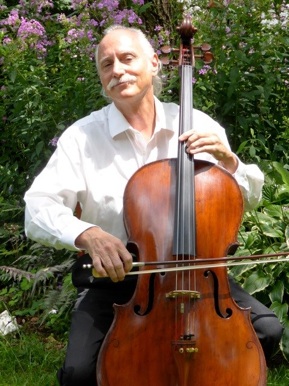
KP: Wow! Is there a particular philosophy that you try to convey in your music?
RC: Follow your heart and the divine spirit that dwells within you.
KP: Who are your favorite composers?
RC: Mozart, Bach, anyone Luciano Pavarotti recorded........I feel John Williams is an American genius, so is George Gershwin and Duke Ellington..........too many to name.
KP: Who are your favorite performers?
RC: Yo Yo, Luciano, Leonard Bernstein, Itzhak Perlman, Pharreal Williams, Stones, Stevie Ray Vaughn.
KP: All classics in their own right! If you could have any three wishes, what would they be?
RC: 1.) Peace on Earth emanating from every individual's heart.
2.) Eliminating the greed and unconsciousness on Earth that creates war, poverty, pain and pollution.
3.) Humanity looks at each other without judgment of nationality, religion, skin color or sexual preference and sees that actually we are all the same on the inside, breathing in that gift of life and longing for love, fulfillment, respect and acceptance.
KP: Wonderful wishes! What’s up next for you?
RC: Hopefully lots of joy and happiness and for sure some new music!
KP: Is there anything else you’d like to “talk” about?
RC: Kathy, you are such an inspiration as a devoted teacher, reviewer and networker and we all really appreciate you and your work!!
KP: Thanks so much, Ron! And thanks for taking the time to chat!
For more information about Ron Clearfield and his music, be sure to visit
his website and his
Artist Page here on MainlyPiano.com.
Kathy Parsons
November 2014

